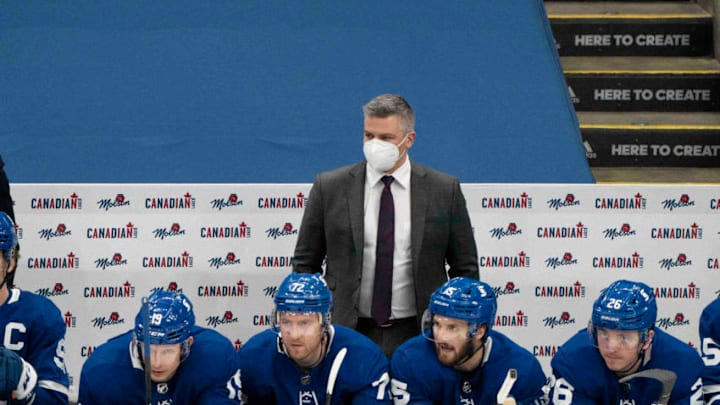The Toronto Maple Leafs are a sneakily good regular season team.
I say this because in the chaos of the last two hockey seasons, both of which were cut short, and both of which saw them lose in the playoffs against noticeably inferior teams, the Toronto Maple Leafs were an excellent regular season team.
This is fact is further obscured by the team’s record under Mike Babcock two seasons ago before Keefe took over, and by the Leafs being in the North division, which was perceived as being much weaker than it was in reality.
I bring this up because even though nobody purports to care about regular season success, it is in fact the best indicator of future playoff success.
One of the biggest reasons why the Leafs are such a successful regular season team is because of Sheldon Keefe. Since Keefe took over the Leafs, they are 62-29-12, and they got points in 66% of their games. They are the fifth best team in the NHL over this period.
The Toronto Maple Leafs and Sheldon Keefe
They completely changed their system when Mike Babock was fired. They endured a ridiculous run of injuries at the beginning of the Keefe Era, sometimes playing with as many as five regular missing. Last year, they won their division and if not for Matthews’ wrist injury and the subsequent neutering of the power-play, would easily have been the NHL’s top team.
So if we are to evaluate Keefe as a coach, we would have to say that he’s done an excellent job of getting the Leafs to the top of the league. Injuries factored in, I think sixth place overall is a great achievement. The team stats are solid, and the team isn’t relying on luck or anything unsustainable to keep them going.
Sure, Jack Campbell won’t continue to get the team points in 80% of the games, but that will be balanced out by the fact that they are unlikely to have a goalie play half their games and post a save percentage under .900 like Andersen did last year. And don’t forget, Keefe’s first year featured a team whose back-up goalie – whichever one they tried – somehow became the NHL’s worst player (literally).
You can complain about the Leafs playoff record under Keefe, but it would be superficial. Keefe can’t make Auston Matthews and Mitch Marner go from 15% shooters to 1% shooters, and nothing he can do will reverse their fortunes. The Leafs had the better expected-goals rating in 11 of their 12 playoff games under Keefe. Results matter, but a reasonable person should understand that the results of a 12 games make up a tiny sample size where luck far outweighs performance as a factor in winning.
The upshot is that Keefe has an incredible record as an NHL head coach so far and there is no reason to think that Joel Quenneville or Jon Cooper are going to give the Panthers or Lightning a coaching advantage over the Leafs.
Those guys have won championships, but they also were once rookie coaches. Reputation plays a big part in how much think coaches help teams. There probably aren’t five people on earth who don’t work in the NHL that know the ins and outs of all three team’s systems and strategies to make an informed call on who the better coach is.
I’m willing to concede that both guys are better coaches, just based on their past winning, but really, at the NHL level, unless a coach has lost his team, how much difference can their really be between coaches?
The Leafs might just well have the third best coach in their division, but I’d be shocked if it made even a single win’s worth of difference by the end of the year.
